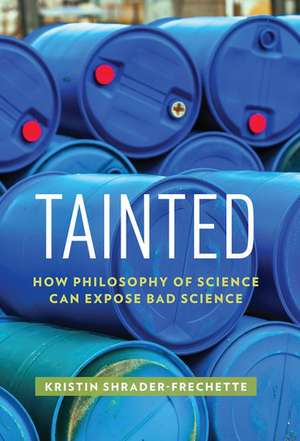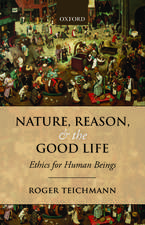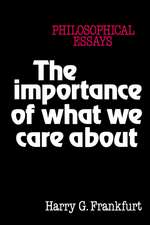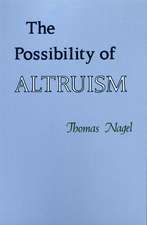Tainted: How Philosophy of Science Can Expose Bad Science: Environmental Ethics and Science Policy Series
Autor Kristin Shrader-Frechetteen Limba Engleză Paperback – 12 mai 2016
| Toate formatele și edițiile | Preț | Express |
|---|---|---|
| Paperback (1) | 334.22 lei 31-37 zile | |
| Oxford University Press – 12 mai 2016 | 334.22 lei 31-37 zile | |
| Hardback (1) | 528.69 lei 31-37 zile | |
| Oxford University Press – 6 noi 2014 | 528.69 lei 31-37 zile |
Preț: 334.22 lei
Preț vechi: 378.78 lei
-12% Nou
Puncte Express: 501
Preț estimativ în valută:
63.95€ • 66.94$ • 53.23£
63.95€ • 66.94$ • 53.23£
Carte tipărită la comandă
Livrare economică 19-25 martie
Preluare comenzi: 021 569.72.76
Specificații
ISBN-13: 9780190603816
ISBN-10: 019060381X
Pagini: 312
Dimensiuni: 231 x 155 x 23 mm
Greutate: 0.46 kg
Editura: Oxford University Press
Colecția OUP USA
Seria Environmental Ethics and Science Policy Series
Locul publicării:New York, United States
ISBN-10: 019060381X
Pagini: 312
Dimensiuni: 231 x 155 x 23 mm
Greutate: 0.46 kg
Editura: Oxford University Press
Colecția OUP USA
Seria Environmental Ethics and Science Policy Series
Locul publicării:New York, United States
Recenzii
Part of the "Environmental Ethics and Science Policy" series, this book will be valuable for general science, legal, and public policy collections. Recommended
This book shows that practical philosophy of science is not only possible but also necessary if scientific research is to serve social needs. Using the tools of science and philosophy of science, of which she is a master, Shrader-Frechette examines scores of cases to demonstrate how science often has been used to mislead -- but should be used to guide -- public policy.
Shrader-Frechette exhibits her mastery of multiple disciplines by applying the tools of philosophy and logic to examine 'science in practice.' She skillfully exposes flaws and unexamined assumptions in scientific claims that have impeded the advancement of human health and welfare.
Shrader-Frechette argues effectively that 'neutrality is not objectivity' in either science or philosophy. She equips the reader to use rational, even-handed analysis to expose the kinds of poor science used to justify public harm for private benefit. The examples are compelling, drawn from a wide range of contemporary and historical issues. An accessible battle manual in the war against 'special interest science' and for the restoration of rationality in public discourse on science.
Kristin Shrader-Frechette discusses how science should be conducted so that it preserves its integrity in the face of pressures from corporate and government interests and, at the same time, contributes to human welfare. The book provides a veritable guide for those perplexed by the claims and counter-claims regularly made in the name of science and offers clear guidelines about how to detect and counter them.
Kristin Shrader-Frechette, arguably the leading contemporary philosopher of science, bridges the gap between theoretical aspects and the necessity of viewing the philosophy of science as practiced in the real world in rigorous, analytic, humanistic, and justice-promoting terms. A must-read for anyone concerned with advancing science in the public interest and countering attacks on the integrity of science and the corruption of science by self-interest.
It is hard to find anyone who has done more to apply philosophy of science to correct injustice than Shrader-Frechette. This book gathers together the fruits of her admirable intellectual and practical efforts over several decades, and gives them a unifying narrative capable of inspiring other philosophers of science to use their skills where they are urgently needed. For this it deserves considerable praise.
This book shows that practical philosophy of science is not only possible but also necessary if scientific research is to serve social needs. Using the tools of science and philosophy of science, of which she is a master, Shrader-Frechette examines scores of cases to demonstrate how science often has been used to mislead -- but should be used to guide -- public policy.
Shrader-Frechette exhibits her mastery of multiple disciplines by applying the tools of philosophy and logic to examine 'science in practice.' She skillfully exposes flaws and unexamined assumptions in scientific claims that have impeded the advancement of human health and welfare.
Shrader-Frechette argues effectively that 'neutrality is not objectivity' in either science or philosophy. She equips the reader to use rational, even-handed analysis to expose the kinds of poor science used to justify public harm for private benefit. The examples are compelling, drawn from a wide range of contemporary and historical issues. An accessible battle manual in the war against 'special interest science' and for the restoration of rationality in public discourse on science.
Kristin Shrader-Frechette discusses how science should be conducted so that it preserves its integrity in the face of pressures from corporate and government interests and, at the same time, contributes to human welfare. The book provides a veritable guide for those perplexed by the claims and counter-claims regularly made in the name of science and offers clear guidelines about how to detect and counter them.
Kristin Shrader-Frechette, arguably the leading contemporary philosopher of science, bridges the gap between theoretical aspects and the necessity of viewing the philosophy of science as practiced in the real world in rigorous, analytic, humanistic, and justice-promoting terms. A must-read for anyone concerned with advancing science in the public interest and countering attacks on the integrity of science and the corruption of science by self-interest.
It is hard to find anyone who has done more to apply philosophy of science to correct injustice than Shrader-Frechette. This book gathers together the fruits of her admirable intellectual and practical efforts over several decades, and gives them a unifying narrative capable of inspiring other philosophers of science to use their skills where they are urgently needed. For this it deserves considerable praise.
Notă biografică
Kristin Shrader-Frechette is O'Neill Professor at University of Notre Dame, where she teaches biological sciences, environmental sciences, and philosophy of science. With degrees in mathematics and in philosophy of science, she has done three post-docs -- in biology, economics, and hydrogeology -- and served on many boards/committees of the US National Academy of Sciences and international scientific or environmental groups. The first female president of 3 professional scientific associations, she has had her scientific research (on quantitative risk assessment in radiobiology, biostatistics, and energy modeling) funded for 27 years by the US National Science Foundation. Author of more than 400 articles and 16 books, including Taking Action, Saving Lives (2007, Oxford University), she writes for both scientific and medical journals.Her books and articles have been translated into 13 languages and also appear in popular newspapers and magazines. In 2004 Shrader-Frechette became only the third American to win the World Technology Award in Ethics. In 2007, she was named one of 12 "Heroes for the US and the World" because of her pro-bono environmental-justice (EJ) work with minority and poor communities. In 2011, Tufts University gave her the Jean Mayer Global Citizenship Award for her pro-bono public-health and EJ Work.































